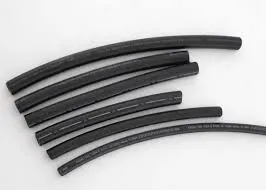Nov . 08, 2024 12:20 Back to list
Hydraulic Hose Manufacturer for Quality and Affordable Solutions
Buying Hydraulic Hose from a Factory A Comprehensive Guide
When it comes to sourcing hydraulic hoses, understanding where and how to buy from a factory can be crucial for successful operations in various industries. Hydraulic hoses play an essential role in the transfer of hydraulic fluid and are integral in the functioning of machinery and equipment in sectors like construction, agriculture, automotive, and manufacturing. This article aims to provide insights into the aspects one should consider when purchasing hydraulic hoses directly from a factory.
Understanding Hydraulic Hoses
Hydraulic hoses are robust tubes designed to carry hydraulic fluids between components. They are typically made from synthetic rubber reinforced with layers of textile or steel to withstand high pressures and are available in a variety of sizes and specifications. Selecting the right hydraulic hose is vital for ensuring safety and efficiency in operations. Mischaracterization can lead to system failures and costly downtime.
Benefits of Buying From a Factory
1. Cost-Effectiveness Purchasing directly from a factory often means lower prices compared to buying from distributors or retailers. Factories can offer competitive rates because they eliminate the middleman.
2. Customization Many manufacturers offer customization options. This allows businesses to specify exact lengths, diameters, and material specifications, ensuring the hose meets the unique requirements of their applications.
3. Quality Assurance When buying directly from a manufacturer, you can often ensure that the quality control processes are in place and observe the manufacturing standards being adhered to. This can provide peace of mind that you are getting a durable and reliable product.
4. Direct Support Factories usually provide direct support, making it easier to resolve issues, answer queries about products, and obtain technical assistance.
Factors to Consider When Buying Hydraulic Hoses
1. Specifications Understand the specifications required for your hydraulic application. Factors such as pressure ratings, temperature ranges, diameter, and hydraulic fluid compatibility are crucial to ensure proper function and safety.
2. Material Quality Different hoses are constructed from various materials. Ensure that you choose a material that can withstand the specific operational environment.
buy hydraulic hose factory

3. Certifications and Standards Verify the certifications and compliance of the hydraulic hoses with safety and industry standards. This is particularly important in industries where safety is a top priority.
4. Manufacturer Reputation Research the reputation of the manufacturer. Look for customer reviews, case studies, and industry recognitions that demonstrate reliability and quality.
5. Shipping and Delivery Consider logistics such as lead times, shipping costs, and options for bulk purchases. Timely delivery is essential for maintaining your operational schedules.
6. After-Sales Service Evaluate the after-sales service offered by the factory. This includes warranty policies and support for installation and maintenance.
How to Find a Reliable Hydraulic Hose Factory
1. Online Research Utilize online resources, directories, and trade websites to locate potential manufacturers. Look for those with good reviews and extensive catalogs.
2. Trade Shows and Expos Attend industry trade shows and expos where you can meet manufacturers, inspect their products, and discuss your needs face-to-face.
3. Networking Leverage industry contacts to find recommended suppliers. Referrals from trusted colleagues or industry associations can lead you to reliable factories.
4. Request Samples Before making bulk purchases, request samples to evaluate the quality of the hydraulic hoses. This will help you make informed decisions about their suitability for your applications.
Conclusion
Purchasing hydraulic hoses directly from a factory can be a smart move for businesses looking to enhance their operations while saving costs. By understanding the specifications, qualities, and reputations of manufacturers, you can make well-informed decisions that lead to increased efficiency and safety in your hydraulic systems. Investing time in thorough research and vetting potential suppliers will ultimately yield the best results for your procurement needs.
-
Best Four Steel Wire Spiral Hose Hydraulic R12 – Durable High-Pressure Hose Manufacturer
NewsJul.08,2025
-
High-Quality 1/4 Hydraulic Hose – Soft, Flexible & Durable Rubber Hoses for Industrial Use
NewsJul.08,2025
-
1 1 2 Inch Hydraulic Flexible Hose - Durable, Reliable, High-Pressure Solutions
NewsJul.07,2025
-
High-Quality 1 2 Rubber Hose - Durable, Flexible Hydraulic Solutions
NewsJul.07,2025
-
Discover SAE Hydraulic Hose Types - High Quality & Durable Hoses from Leading Factory Supplier
NewsJul.06,2025
-
High Pressure Wire Hydraulic Rubber Hose Supplier Durable & Reliable 1SN Hose Solutions
NewsJul.06,2025
